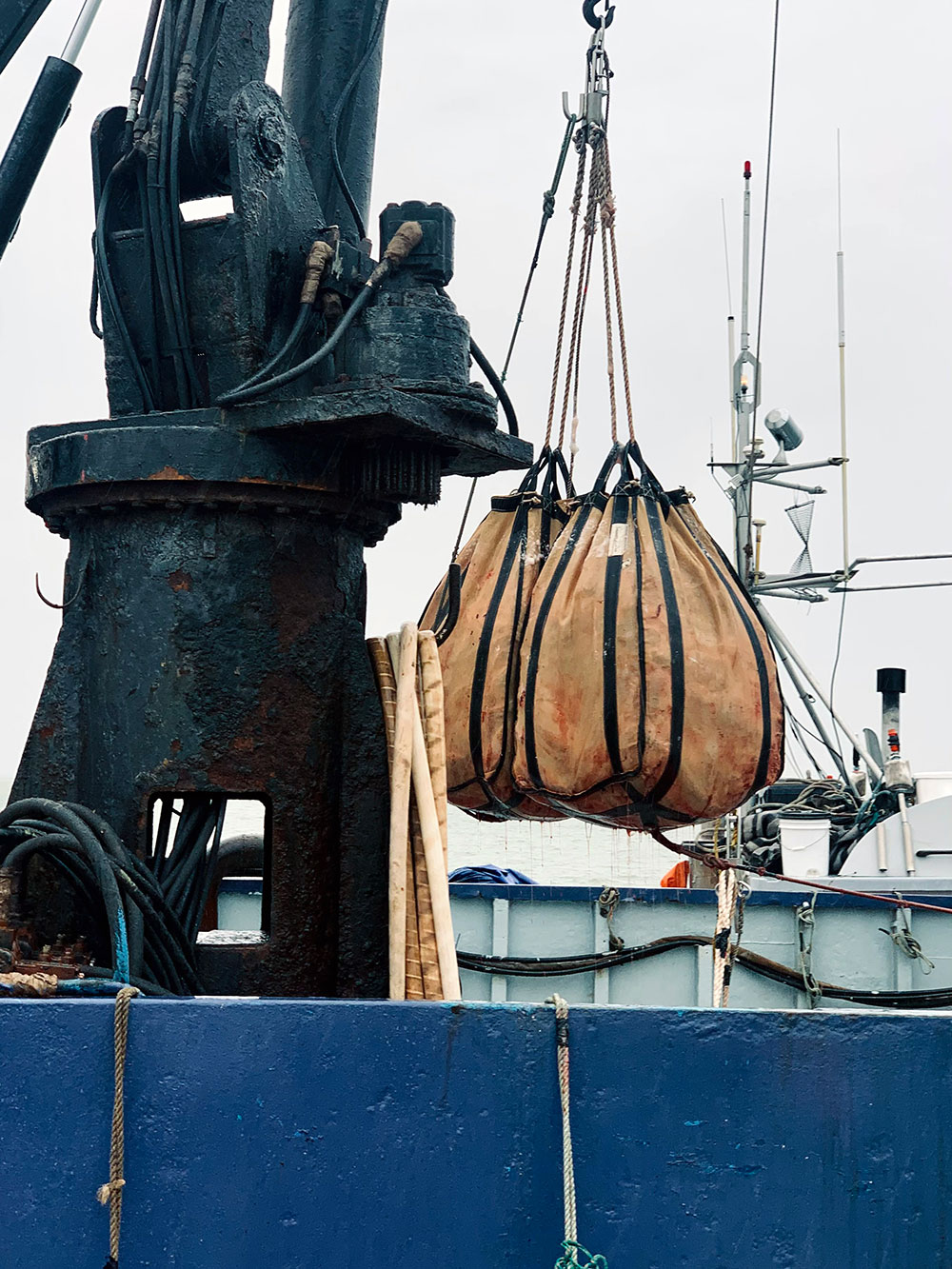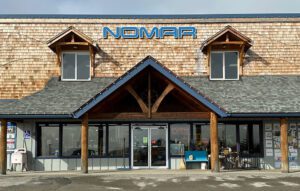
On a winter’s day in 1982, a couple of fishermen walked into Kate Mitchell’s canvas and upholstery shop in Homer with a problem: their net brailers were marking their catch, so many of their fish were downgraded by processors.
They asked Mitchell if she would build a bag that would work to quickly offload the catch, but not mark the fish. “They had a problem, and I had a sewing machine,” recalls Mitchell, founder of NOMAR, the now well-known marine company with an 18,000-square-foot manufacturing and retail store facility in Homer, Alaska, with and customers nationwide.
Seafood harvesters in Bristol Bay and False Pass were delivering their salmon harvests in seine web bags and fish pressed against the web were getting marked, making them of lower value to processors.
So, Mitchell got to work, producing the first NOMAR “brailer bag” made of industrial tarping material with grommets in the bottom to drain the gurry, the waste parts of the fish.
There were problems with the original design, tested by False Pass fisherman Don Ballard, so Mitchell turned to a screen-like fabric available from a supply house in California and tried again.
“We called it a brailer bag,” Mitchell wrote, in her 2018 memoir, The Bag Lady at the End of the Road.
“But the seine web cargo nets are called brailers. We needed a trademarkable name for our product,” she said. “We called it NOMAR: NO MARk the fish. We trademarked the brand name.”
Mitchell later changed the name of the business to NOrthern MARine Canvas Products.
“We were not just the canvas shop anymore,” she explained.
The new NOMAR bags worked well, allowing the fish gurry to drizzle out of the bags as the catch was offloaded at Homer Harbor. In October 1984, the Copper River Fisherman’s co-op placed an order for 500 NOMAR brailers for delivery in the spring of 1985.
That winter was a real learning curve for Mitchell, who at the time had two employees and only three industrial sewing machines. They added a night shift of more sewers in their cold, dirt floor Quonset hut facility, and the bag lady crew was able to complete the order. Meanwhile her husband Ben, who was retired from the Coast Guard and running the Homer Boat Yard, kept the sewing machines operable. Word of how well those NOMAR brailers worked spread and more orders came in for the bags in different sizes, to accommodate specific fishing boats.
At one point a local gear supplier, whom Mitchell did not identify by name, decided to compete with her by sending her design offshore to be copied, and a cheaper version hit the market, one that would give the other gear supplier a higher profit margin. Turned out the cheaper bag didn’t work.
With the first delivery, the seams pulled out and the fish fell out, and fishermen who had purchased the cheaper bags brought them to NOMAR for repairs. Mitchell told them to take them back to the seller and to tell them how angry they were.
Through this episode and others, Mitchell prevailed, coming up with solutions for everything from financing to production issues, all the while raising two children, and answering her own question: “So how does a married woman with little more than a sewing machine create a business?”
For Mitchell it boiled down to “you show up every day and turn out a high-quality product that people want to buy,” in NOMAR’s case fishing gear, bags, clothing and custom work on request. That’s how her career grew from making recreational boat covers in a converted school bus in Ketchikan to a thriving wholesale and retail firm in Homer that employs 25 people year-round. It produces everything from brailer and slush bags for commercial fishermen to seiner jackets, hoodies, pants and vests for children and adults.

As NOMAR’s online catalog notes, “there is never intolerable weather. There is only inadequate clothing.”
As the wife of a Coast Guardsman, Mitchell opened the doors of Mitchell’s Marine Canvas and Upholstery in an old, converted school bus in 1978. She kept busy making canvas covers for recreational boats at a shop rate of $25 an hour.
She already had done a lot of sewing over her years as a Coast Guard wife, from baby clothes and curtains to bedspreads and stuffed toys. After all, she noted, she’d spent many a childhood hour in her parents’ front room under her mother’s sewing table.
Most of Mitchell’s customers in Ketchikan had been operators of sport fishing vessels, but in Homer, she soon realized her market would be with commercial fishermen.
“It didn’t take much to recognize how many gillnet fishermen there were in Alaska,” she said.
Getting started in business as a woman with limited finances was a challenge. There was no Internet, and nobody else doing what Mitchell wanted to do to learn from.
Most fish were still going in cans. The fishermen were not making as much money as they could and were looking for ways to improve their income. While the price paid to fishermen is now much improved, the cost of living has gone up, including the cost of shipping.
NOMAR now has the advantage of Internet communications, but Mitchell said about 50% of freight expenses still consist of getting produce from Anchorage to Homer.
Today, her daughter, Jennifer Hakala, and son, Richard Mitchell, are the owners of the business. The company buys supplies for producing its products a year ahead. Top-selling consumer products include scabbards and a rifle-storage system designed to protect the gun itself.
NOMAR’s current building, a two-story manufacturing facility, was made possible by the commercial fishing industry, Mitchell said.
“It all came about because the commercial fishermen needed high quality, long-lasting gear. They needed it and I made it,” she said.
In addition to their customers throughout the U.S., NOMAR also ships product to Europe and Asia.
Mitchell attributes NOMAR’s success to consistency of product.
From her mother she said, she learned “you can do anything you set your mind to. You simply have to outlast the bastards trying to stop you.”
Working with the previous generation of fishermen was a hard sell, but this generation has grown up knowing the brand, and they will keep buying as long as the quality is the same as the one on their dad’s boat. “We had to prove we were capable,” said Mitchell. “It doesn’t come easy, but it isn’t impossible.”
More information about NOMAR and a complete list of its products, including Mitchell’s book, is available at www.nomaralaska.com.
Margaret Bauman is an Alaska journalist and photographer with an extensive background in Alaska’s industries and environmental issues related to those industries. A long-time Alaska resident, she has also covered news of national and international importance in other states on the staff of United Press International, the Associated Press, and CBS News.
